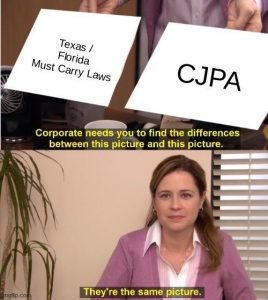Why I Oppose the California Journalism Protection Act (the Short Version)
 I recently wrote a lengthy blog post explaining the many problems with the California Journalism Protection Act (JCPA), AB 886. I submitted a letter of opposition to the Senate Judiciary Committee with just some quotable lowlights. My letter:
I recently wrote a lengthy blog post explaining the many problems with the California Journalism Protection Act (JCPA), AB 886. I submitted a letter of opposition to the Senate Judiciary Committee with just some quotable lowlights. My letter:
__
CJPA is bad policy:
- CJPA is unlikely to create or sustain any journalism at all. Instead, it will simply enrich the journalism operators’ stockholders, even if they don’t spend any payments on journalism at all.
- CJPA doesn’t support California-focused journalism. Indeed, it’s likely to transfer wealth away from California entities to benefit non-California entities.
- The principles behind CJPA have been tried in other countries, with no apparent success anywhere.
- The “arbitrations” will likely set royalties that are greater than the profits of the associated content, which encourages online services to categorically remove that content. If so, CJPA counterproductively would make journalism more obscure and further impoverish journalism operations by reducing their referral traffic.
- CJPA creates the risk that journalism operations become dependent on volatile and unreliable royalties. Even if CJPA worked as intended (which it won’t), it will prompt journalism operations to build vulnerable, not sustainable, business models.
- CJPA disrespects a fundamental governance principle that the government can’t force one private party to involuntarily hand over money to another private party.
CJPA is legally problematic:
- CJPA violates the First Amendment. A Florida law mandating that online services carry journalists’ content was struck down by the Eleventh Circuit.
- CJPA is preempted by federal copyright law. CJPA creates copyright-like protection for material that Congress (if anyone) exclusively has the power to propertize.
- CJPA is preempted by 47 U.S.C. §230. It imposes liability for publishing and moderating third-party content.
Other constitutional concerns include the Dormant Commerce Clause and the Takings Clause.
UPDATE: One more thing I should have added. The per-impression metric for computing royalties is miscalibrated. It rewards clickbait, sensationalized, and polarized content that are not good journalism and do not advance the bill’s goals of improved democratic functions.
